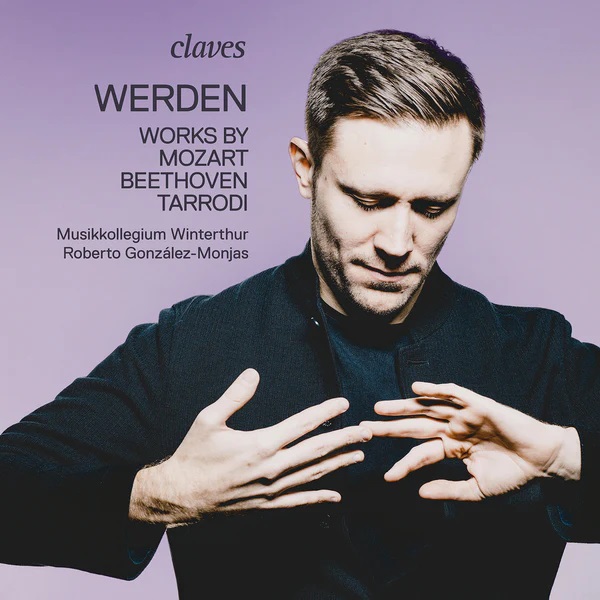Mit fünf markanten Akkord-Schlägen eröffnet Roberto González-Monjas das spannende Programm. Beethovens Ouvertüre ‘Die Weihe des Hauses’ deutet musikalisch auf Neues hin. Feierlich, selbstbewusst klingt diese Musik – im Zeitalter der Aufklärung, der Revolutionen werden alte Zöpfe abgeschnitten.
So erklärt sich auch der Titel dieses neuen Albums – ‘Werden’, den Andrea Tarrodi in seiner Mozart-Spiegelung Fragments of Enlightenment aufgreift. Tarrodis Umgang mit Mozart-Themen ist schlichtweg faszinierend – wie er die Musik verfremdet und sie einem doch stets wie ein vertrauter Begleiter vorkommt. Nicht mit minder spannend ist die Umsetzung von Roberto González-Monjas und dem Musikkollegium Winterthur. Sie schaffen eine sehr stimmige Atmosphäre, an der am Horizont immer wieder Mozart auftaucht.
Der Salzburger Meister ist letztendlich der Protagonist des Programms. Der Chef des Musikkollegiums Winterthur hat sich nämlich vorgenommen, die Trias von Mozarts letzten Symphonien, die in einem wahren Schaffensrausch binnen kürzester Zeit entstanden sind, neu einzuspielen.
Den Anfang macht die Es-Dur-Symphonie Nr 39. Auch hier steigt Roberto González-Monjas wirkungsvoll, mit dramatischer Wucht in medias res ein. Das Allegro gestaltet der Dirigent sanglich, fein detailliert und in einer klug ausgetüftelten Balance aus Legato und kantiger Bogenführung, so dass die Musik auch Beethovensche Wucht hat, in ihren Eroica-Reminiszenzen gewissermaßen Zukunftsmusik ist.
Dem Allegro-Satz schließt sich ein Andante an, in dem die Interpreten ein klanglich feines Spannungsfeld zwischen Mysterium und Klarheit, zwischen Schatten und Licht schaffen. Fast konsequenterweise erfährt man das kurze Menuett wie einen Befreiungsschlag, indes die Symphonie in einem lichten, schwungvoll-brillanten Finale gipfelt.
Mit diesem Album ist in der Tat eine spannende Trilogie im Werden.
Roberto González-Monjas opens the exciting program with five striking chord strokes. Beethoven’s overture ‘The Consecration of the House’ musically points to something new. This music sounds solemn, self-confident – in the age of enlightenment, of revolutions, old customs are cut off.
This also explains the title of this new album – ‘Becoming’, which Andrea Tarrodi takes up in his Mozart reflection Fragments of Enlightenment. Tarrodi’s handling of Mozart themes is simply fascinating – how he alienates the music and yet it always seems like a familiar companion. No less exciting is the realization by Roberto González-Monjas and the Musikkollegium Winterthur. They create a very coherent atmosphere in which Mozart appears again and again on the horizon.
The Salzburg master is ultimately the protagonist of the program. The Music Director of the Musikkollegium Winterthur has undertaken to re-record the triad of Mozart’s last symphonies, which were written in a veritable creative frenzy within a very short time.
The E-flat major Symphony No. 39 is the first, and here, too, Roberto González-Monjas enters medias res effectively, with dramatic force. The conductor shapes the Allegro in a songful, finely detailed manner and in a cleverly worked-out balance of legato and angular bowing, so that the music also has Beethovenian force, and in its Eroica reminiscences is to a certain extent music of the future.
The Allegro movement is followed by an Andante in which the performers create a tonally fine field of tension between mystery and clarity, between shadow and light. Almost consequently, the short minuet is experienced as a liberating blow, while the symphony culminates in a light, swinging and brilliant finale.
With this album, an exciting trilogy is indeed in the making.





















